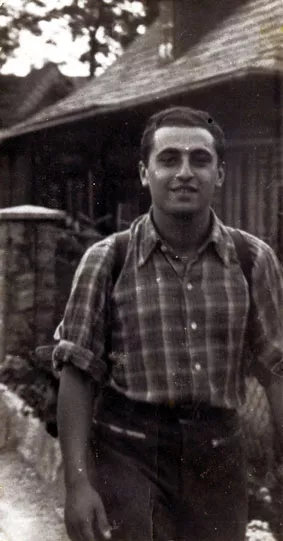Dawid Bachner on vacation in 1939
This is my brother Dada. It was taken while he was on vacation in Zakopane in August 1939. I don’t know who took it.
My brother Dawid was born in 1918 in Warsaw. He was always called Dada, just that, even later. My brother was a good boy, really. When he was younger, he was stupid and beat us up. My mother would chase him around the table with a carpet-beater. You never forget things like that. When he was young, he played with the neighbors' children out in the yard. Then he had some friends at school. He went to a secondary school where most of the students were Jewish, too. The school was called 'Spojnia' and was a teachers' cooperative, somewhere at Dluga [a street downtown, on the border of the Jewish district]. It was a school for boys, rather leftist. We had the same geography teacher, Stefcia Halbersztat. She had a crush on my brother and they went to Zakopane together later. She married an eye-doctor, Arkin. My brother didn't want to go to college, because he didn't like studying, but he did graduate from high school. I remember I went to stand at the door of his school when he was taking his matriculation exam, because I was very worried about him. Until the war he worked in our father's leather store at Franciszkanska.
In August 1939 I was in Muszyna [a resort in the south of Poland, in the Beskid hills] with this friend of mine from the print shop. On 1st September 1939 I went back to work at 'Linia i Litera' [on 1st September 1939 the German army crossed the Polish border and World War II began]. One of my bosses said they were putting up posters about the draft, so I started crying. So this son-of-a-bitch, one of the owners, says, 'What are you crying for?' So I said 'What do you mean, what for? I have a brother who is 18.' My brother responded to the Umiastowski order in September, I think. A whole group of my friends went as well.
He came back to Warsaw. I wrote to my friend Lidka, because she lived in the East, and Kolomyia [now Ukraine] was not yet taken by the Germans, asking if my brother couldn't hide with them. But her husband wrote back that the entire family came to stay with them. That was the beginning of a miserable life.
During the war I lived with my family at Leszno. We remained there until the deportations began. It was September 1942, a few days before the major deportation [Grossaktion], when I got out of the Ghetto. I hid a few pictures in my purse: my mom's, my brother's (also this one) and sister's, her son's and my own. That is how they have survived.






















